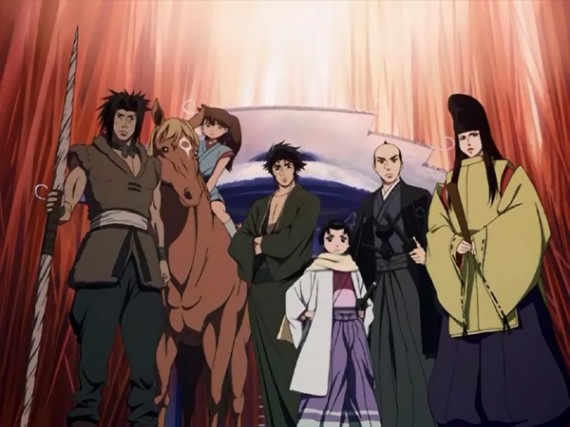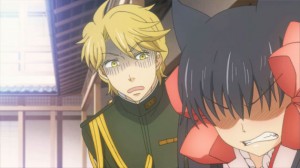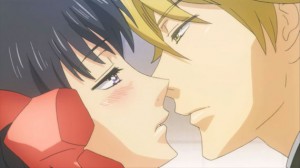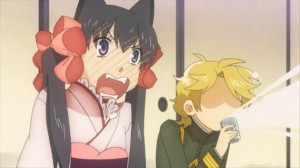I’m in a share-y mood, so I’m going to go all stream-of-consciousness like I used to back in the halcyon days of this blog. No real topic, no defined start and end, no “point”. Just what I’m thinking.
The post title, if you’re interested, just means something like “A ramble, for the first time in awhile.”
I wrote this morning on Facebook that I wished I was better at humor. I’m extremely serious, and I tend to react badly when someone throws a discussion off-topic in a humorous way. Basically, I don’t understand and can’t really put up with trolls. This is why I never read forums. I also hate practical jokes. I love laughing, and I enjoy funny things very much, but I hate it when serious discussions are derailed for a laugh (or even to make a point, because I often have trouble figuring out what point is being made). I’d like people to just respond respectfully and openly rather than being what I interpret as summarily dismissive.
Other people don’t seem to have this problem, though, so I can’t help but feel deficient.
Abrupt topic shift! I started using the WaniKani beta yesterday. WaniKani is a kanji learning system that incorporates SRS and fun. I’ve really enjoyed it so far, and I hope I can stick it out. Other than watching lots of anime, I haven’t really been doing much with my Japanese study lately, so I’m really wanting to get back on track (or on a track in general).
Speaking of anime, I’m finding myself infinitely perplexed by anime genres. Polar Bear’s Cafe, which I adore, is apparently shoujo. I’m not sure what genre I would put it in if I had to choose, but when I think shoujo I think Sailor Moon, so obviously there’s a disconnect somewhere. I’m also confounded by the shounen genre, as evidenced by this post and comments. Either Japan is cool with young kids watching really violent and sexual stuff, or there are subgenres I’m unaware of…or something. I guess knowing what genre something is doesn’t really matter in terms of enjoying it, but I would like to find a good way to identify anime that I have a high chance of enjoying, and to know what to expect from it. The best I’ve come up with so far is that I generally like “sports” anime, where characters work towards a goal and compete with each other, and “slice of life” anime, especially high school. I generally dislike “harem” anime, where one male character is surrounded by a bunch of girls drawn in an oversexed way. But anime isn’t always labeled this way, especially on Crunchyroll; their “slice of life” genre includes surreal comedies, for example. I usually have to read a show’s description and watch the first episode before I know if I’ll enjoy it. Unfortunately for me, I watched School Days all the way through without knowing what I was in for, and that was just traumatic.
I recently watched the first season of Code Geass: Lelouch of the Rebellion on Crunchyroll. (Season 2 isn’t available.) The show isn’t what I would normally go for. It is intensely tragic. But somehow, it felt like it was what I needed to see at that moment. It was a reminder that we can become blinded by our own goals and ambitions, and of how much our pasts can define us if we let them. As you might imagine, I identified most strongly with Suzaku (voiced by my beloved Sakurai Takahiro). But there’s no way I could argue that Suzaku always did the right thing or made the right choices. You can’t say that for anyone in the show. That’s what makes it so compelling and real and, again, tragic. As the audience, you can see how everyone’s decisions come together to impact the entire country, and you wish so-and-so knew such-and-such or hadn’t made a certain decision. None of the decisions themselves feel fated, like there was nothing else the characters could have done. Instead, it’s kind of like in a video game where the choices you make build up to determine your character’s “alignment”. But as things progress, the options diminish, and the ones that could right a character’s path become more and more dangerous.
The story reminds me a bit of Song of Ice and Fire. No one has the full picture but the audience, who is left simply watching as horror after horror unfolds. Unlike Song of Ice and Fire, though, I feel like there is an actual purpose behind the story in Code Geass. Song of Ice and Fire just feels like a laundry list of bad things happening.
Health-wise, I’m doing okay. I feel like I spend most of my day either trying to figure out what to eat or actually eating something. It’s pretty annoying. I have found a new, delicious Atkins bar, the Peanut Butter Granola. It is awesome and I’m very happy to add it to my arsenal. In terms of real food, I’ve found my George Foreman electric grill to be invaluable in easily cooking chicken, burgers, and tilapia, and I’m still relying on yogurt, cottage cheese, and cheese snacks to supplement my protein. I also eat a lot of peas. I’ve added other vegetables and fruits to my diet, in moderation. My biggest problem is carbs; I eat too many potatoes and noodles and too much bread, and I haven’t been as careful about choosing wheat over white. Sweets aren’t really an issue for me anymore, as I rarely find them all that delicious, though I do wish I did, sometimes.
Personal training is also okay. The worst part about it is having to deal with another person, but that is kind of the point. They’re there to motivate me and to give me something new to do. So I endure.
Actually, I am feeling better about personal training right now than I was when I wrote the previous paragraph, because in the intervening time I went to a personal training session, and while I was utterly depressed going in, I actually feel fairly good after having worked out. So there’s that.
I’ve been depressed off and on for awhile now. I feel immense pressure, mostly from myself, to do something, but I can’t seem to figure out what, exactly. I’ve been trying various things without success. I’ve also been running away from various things. I want to feel in control, to have a plan. It’s killing me not to.
I’ve also had a lot of time to think these past few months…perhaps too much time. I spent a long while trapped in misery, thinking of all the pain in the world and in my own personal circles that I am powerless to do anything about. It took an incident of extreme thoughtlessness on my part–an event in which I tried to help, but had no resources to do so, and ended up adding to other people’s burdens–that helped me realize I could prioritize, and that sometimes I have to say no. I’m happy to say that I have at least pulled myself out of that murky hellhole of guilt. I seem to keep finding other things to worry about, but I don’t think I will fall into that same chasm again.
I have, however, been increasingly down on myself lately, and I’m even finding myself resentful of others where I don’t want to be resentful. I’m projecting my own confusion and helplessness on them, judging them for the things I self-judge, and it’s not fair to them or to myself. Intellectually I realize that I am partially crippled by circumstance, and while I can’t use that as an excuse per se, I can at least be more understanding of myself and allow myself to make mistakes and learn from them rather than simply hating myself and spinning my wheels in frustration. But it’s so very hard not to blame myself for everything.
I’ve even found myself thinking despairingly, “I’m so fat,” when that is hardly true. It was always my old internal mantra, and I guess it just naturally comes out when I despise myself. I’ve been trying to remind myself that no, actually, I’m not fat, but that’s hard, too. My inner voice argues back, What about all that flab?
Further, when I think about all the things I want and can’t have–children, frequent world travel, a piano, even just eating out–all I can think is that it’s my own fault, that I should have done something differently, or I should be doing something differently now. I don’t know what, though. It makes me miserable.
I’m tempted to round out this post with an uplifting “I’ll just have to do my best!” paragraph, like usual. But I promised not to have a point or a real ending. So I won’t. I’m not really feeling that emotion right now, anyway.
Instead, I’ll just mention that I’ve been watching Glass Mask again, and I am so jealous of the heroine, Maya. Her life is hell, but she knows what she wants to do and she’s willing to fight for it. I wish I had that kind of commitment to something. Something profitable, that is. Of course I have that commitment in spades when it comes to my husband and family.
Maya gives up her family to pursue her dream. I don’t think I could do that. I think that sort of sacrifice is easier when you’re young; you want to escape and find something new. I felt that way in my early 20s. I don’t feel like that now, or at least not in the same way. I still want adventure, I still want passion, I still want to learn and explore. But I can’t abandon my family.
It’s hard to explain what I mean by that. I don’t mean I wouldn’t move to another city or country, for example. I just mean that I could no longer make that decision on my own, without considering other people’s needs. My life isn’t just about me.
Oh hey, I have another topic. It’s kind of weird, and I’m actually kind of afraid to talk about it. It’s men.
For much of my life, the story heroes I identified with most were men. I wished I could be like Anne of Green Gables, but I knew I never could (she was slender with slim fingers; I was shaped more like her friend Diana, of whom Anne was jealous but I was not). I also liked Pippi Longstocking. But for the most part, I always felt like being a girl was too complicated, and it would just be easier if I was a boy. (I know; the grass is always greener.) I don’t believe I am gender-queer or anything, just that I didn’t know what to make of myself, and I was trying to figure out what role I played in life. As a child I pretended to be boys plenty of times: Simon of The Chipmunks, Donatello of the Teenage Mutant Ninja Turtles. I didn’t want to be one of the Chipettes; they weren’t in all the stories and when they were they were often annoying. I didn’t want to be April O’Neil, because while she was cool in some ways, she wasn’t one of the core group, really. She wasn’t a ninja. She wasn’t a turtle. I certainly didn’t want to be Venus de Milo, the token female turtle, named not after an artist but after a work of art. Even as a kid that offended me. (I did pretend to be Smurfette when I was very young, but I didn’t particularly like it, because she was everyone’s love interest, and that seemed weird.)
It always seemed like there was a group of cool, interesting guys, and then one girl who was put in to have a girl there. I wanted to be one of the interesting people. And, to be frank, I didn’t usually find the shows with lots of girls in them, or centered around girls, to be all that interesting. I didn’t care about hair and makeup and clothes. I wanted to see adventure stories.
One exception was Clarissa Explains It All; I adored that show and wanted to be Clarissa with all my might. She was very much like me; she programmed on her computer (though she did far more advanced things, like building video games in which she threw things at her little brother) and she wore the clothes she felt like wearing, which in retrospect were “cool”, but I felt like they expressed her personality rather than following trends. She also liked Star Wars, which to me was the epitome of awesome (in the hoary pre-prequel days).
As I got older I started wishing I was a boy not as much because there were few cool stories about girls, but because I started watching USA and Lifetime movies and seeing how often women were victimized by men. I thought if I was a man, I would have less to fear. It occurred to me only this morning that I spent a great deal of my life being afraid of men. To be honest, I’m still afraid of them. I spend a lot of time thinking about how to protect myself–maybe more than the average woman? I don’t know. It always felt like even saying the wrong thing could result in violence against me. There are things I still fear to do or say.
Intellectually (I like to evaluate things intellectually, apparently!) I realize that this is sexism on my part. The actual percentage of men who would respond to an offense violently is small, at least here in the US. I do all my male friends a disservice by thinking this way, though I can at least say I don’t think any of them would be violent. I just have this creeping fear inside. Seeing some of the online comments against women, all the legislation aimed at women recently, and all the violence against women around the world only makes me more paranoid. I don’t like living with this fear, but it’s been a part of me for so long I’m not sure how to get rid of it.
I hate when the strong hurt the weak. I have always hated it. As a kid I couldn’t stand seeing it on TV, even in cartoons. I still don’t like it; I won’t watch shows like Law & Order: Special Victims Unit. And I hate how casually people threaten violence against one another, especially online. I hate…hate.
Non-sequiturs to escape the previous topic:
Nichijou‘s first opening theme song, “Hyadain no Kakakata Kataomoi-C”, is awesome.
What is up with SKET Dance adding five million female characters with ever-increasing busts?
Natsuyuki Rendezvous is a weird-ass show.
I need to find a new place to explore.
Chobani’s plain Greek yogurt is the best.



